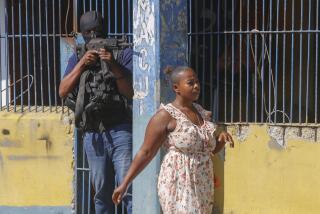Honduras talks aim to end political crisis
- Share via
TEGUCIGALPA, HONDURAS, AND MEXICO CITY — Representatives of Honduran President Manuel Zelaya and the de facto leaders who deposed him in a coup in June came together Wednesday in an effort to end the political crisis that has divided and isolated the impoverished nation.
With foreign ministers and diplomats on hand to nudge the deeply polarized parties, a tense round of negotiations got underway, aimed at rescuing Honduras from what one participant called “darkness, infinite chaos, fear and uncertainty.”
“We are here to find concrete solutions to a situation that cannot go on,” said Jose Miguel Insulza, secretary-general of the Organization of American States, which is overseeing the talks.
Progress was expected to be slow. The two principal protagonists, Zelaya and the man who replaced him, Roberto Micheletti, will not meet, and it was not clear that either was willing to make concessions, most notably on the most contentious point: Zelaya’s return to power.
The negotiations Wednesday were the first since mid-July, when Costa Rican President Oscar Arias brokered a 12-point plan that was ultimately rejected by Micheletti.
Diplomats said they’ve detected new impetus that could lead to a breakthrough. Honduras is suffering international sanctions as punishment for the coup, including the loss of hundreds of millions of dollars in desperately needed aid and trade. Washington also yanked the U.S. visas of Micheletti and other top officials and businessmen.
And many Hondurans, including those who backed the coup, are increasingly fearful that continued political upheaval will threaten elections scheduled for Nov. 29.
“The hopes of Honduras, and the world, depend on to what extent both Zelaya and Micheletti . . . accept that the current situation is untenable,” the Honduran daily El Heraldo said in an editorial Wednesday. The international community backs Zelaya in his demand to be reinstated.
Under the plan drafted by Arias, who is also a Nobel peace laureate, Zelaya would assume the presidency with limited authority as part of a coalition government. His term ends in January.
Micheletti has steadfastly refused to accept the proposal to reinstate Zelaya. But some of Micheletti’s allies have begun to waver.
U.S. Ambassador to Honduras Hugo Llorens held several secret meetings with top business and political figures to push for acceptance of Zelaya’s return, according to participants.
Zelaya, a wealthy timber tycoon whose shift to the left alienated Honduras’ traditional, powerful elites, was ousted June 28. Army officers took him from his home at dawn and put him on a plane to Costa Rica, in the first military-backed coup in Central America in 16 years. Two weeks ago, Zelaya sneaked back into the country and took refuge at the Brazilian Embassy.
Micheletti and his backers accuse Zelaya of using possible constitutional reform as a way to serve a second term, a move deemed illegal by Congress and the courts.
The talks Wednesday opened with a formal ceremony at the Clarion Hotel in Tegucigalpa, presided over by Insulza of the OAS. Three-member delegations representing each side then convened behind closed doors.
Micheletti sounded a conciliatory note on the eve of the talks, pledging to bring a “new spirit” to the dialogue. But on Wednesday night, he angrily confronted diplomats of the OAS delegation, including a senior State Department official, apparently scolding them for not showing sufficient sympathy to his side.
“We are not afraid of the United States, nor of the State Department, nor of Mexico or Brazil,” he said loudly to the stunned diplomats. “But we are afraid and panicked when it comes to Zelaya.”
The ousted president’s supporters have voiced concern that the pro-coup forces would use negotiations to run out the clock -- a warning he reiterated Wednesday.
The crisis in Honduras has vexed diplomats throughout the hemisphere. Washington has proved itself unable to resolve it despite its historically strong influence over the small Central American nation.
Honduran supporters of the coup contend that they have saved their country from what they call “socialism,” but most of the rest of the world saw the coup as a throwback to Latin America’s troubled past.
Victor Meza, who served as Zelaya’s interior minister and heads his negotiating team, said the crisis has shown that while Honduras succeeded in building democratic institutions, it still lacks a “culture of democracy.”
“Errors in democracy should be corrected by more democracy, not by coups d’etat,” he said.
--
Renderos is a special correspondent.
More to Read
Sign up for Essential California
The most important California stories and recommendations in your inbox every morning.
You may occasionally receive promotional content from the Los Angeles Times.














